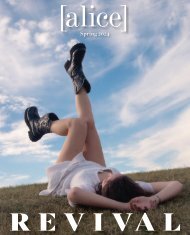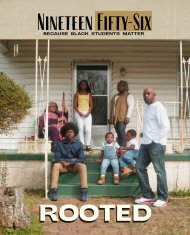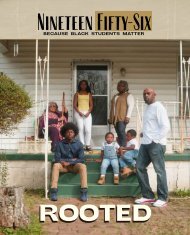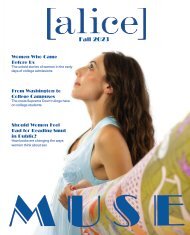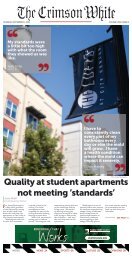Nineteen Fifty-Six Vol. 4 Issue 1
Nelson Mandela once said “Education is the most powerful weapon which you can use to change the world.” With the Fall 2023 Issue of Nineteen Fifty-Six, "Blackology" we wanted to highlight stories of Black Education from past, present and future. Focusing on the beautiful aspects of Black education but also he trials and hardships with it as well. Mostly we wanted to celebrate what it means to Black and Educated in an edition dedicated to Black educators, students and youth.
Nelson Mandela once said “Education is the most powerful weapon which you can use to change the world.” With the Fall 2023 Issue of Nineteen Fifty-Six, "Blackology" we wanted to highlight stories of Black Education from past, present and future. Focusing on the beautiful aspects of Black education but also he trials and hardships with it as well. Mostly we wanted to celebrate what it means to Black and Educated in an edition dedicated to Black educators, students and youth.
Create successful ePaper yourself
Turn your PDF publications into a flip-book with our unique Google optimized e-Paper software.
Discussing Sexual<br />
Health Education<br />
With Five Horizons<br />
Jeffrey Kelly<br />
Conversations surrounding sex and sexual health can feel taboo or uncomfortable for many to discuss, regardless<br />
of age. However, it’s crucial, especially for young people, to be equipped with the language a high-quality sex<br />
education can provide to keep themselves and their partners healthy. However, as of Sept. 1, while 25 states and<br />
Washington, D.C., mandate sex education and HIV education, only 18 states require program content to be medically<br />
accurate, according to the Guttmacher Institute, and only 10 states require programs to provide instruction that is<br />
appropriate for a student’s cultural background and isn’t biased against any race, sex or ethnicity. <strong>Nineteen</strong> <strong>Fifty</strong>-<strong>Six</strong><br />
sat down with Five Horizon’s Rachel Queen, a registered nurse, and Iyana Diaz, outreach specialist and UA alum, to<br />
demystify a few misconceptions about sexual health education.<br />
Q: What are the biggest issues that y’all have seen<br />
regarding sexual health for people in Alabama or,<br />
specifically, Tuscaloosa?<br />
Queen: Having insurance to pay for their testing and<br />
treatment is a barrier for them. Outreach provides free<br />
testing in the community, but not everyone is aware of<br />
that, and then also they aren’t able to test for everything.<br />
So, they do have a rapid HIV test, they can test for<br />
gonorrhea, chlamydia and trichomonas, but they don’t<br />
have a way to test for syphilis in the community, and there<br />
has been a big outbreak. That’s the biggest barrier that I<br />
have seen. Also, some people don’t have transportation,<br />
we try to use those resources that we have— we have<br />
some transportation resources.<br />
Diaz: I will definitely say those as well. And then another<br />
thing, especially like dealing with college students,<br />
depending on what kind of education you’ve got regarding<br />
sexual health, a lot of times there’s a superhero complex,<br />
so it’s like, it doesn’t affect me rather. So, we’re really<br />
trying to put out if you have sex, you need to get tested<br />
no matter what, every three to six months and then also<br />
because a lot of people don’t have that, like sexual health<br />
education, they don’t think— they don’t really know what<br />
all sex entails.<br />
34<br />
So, some people think like, if you just have oral sex, it’s<br />
not really sex, you can’t get like the same STIs or STDs as<br />
you can get in the genital area, but again, it’s oral sex— so<br />
just really knowing what sex is [and] all that it entails. I<br />
think a lot of times, people don’t really understand that.<br />
That’s why we really try to be out in the community as<br />
much as possible while we’re always on campus doing the<br />
sexual health forums and education sessions.<br />
Q: When y’all are reaching out to the community, what are<br />
the most common questions that you get when it comes<br />
to sexual health?<br />
Queen: I will speak to some clients that come in the clinic<br />
and maybe have an oral like gonorrhea chlamydia in their<br />
throat. They do not realize that they can get gonorrhea<br />
and chlamydia and their throat from performing oral sex,<br />
and then they don’t realize that someone performing<br />
oral sex on them can allow them to get gonorrhea and<br />
chlamydia in like they’re penis, vagina, rectum. That’s a<br />
common, I guess, question people have for us.<br />
Also, I think, you know, the CDC recommends that anyone<br />
who’s sexually active is on PrEP, which is HIV<br />
prevention medication. A lot of people think that, you<br />
know, they are not going to contract HIV; that’s just<br />
more in the gay community. Well, everyone is at risk for<br />
contracting HIV, and also people do not realize that it<br />
does not matter if you have insurance, or you do not have<br />
insurance; we can get your PrEP medication for free.<br />
Diaz: Another thing about PrEP is, like, I don’t even have<br />
sex that much like it only takes one time. Another<br />
one is like condom usage; people don’t like<br />
using condoms. A lot of times, I hear<br />
it doesn’t feel the same, or it doesn’t<br />
fit a lot of time, not knowing how to<br />
put the condom on appropriately. I<br />
didn’t know how to put the condom on<br />
properly until I started working here. In<br />
all honesty, I didn’t know about PrEP till I<br />
started working here.<br />
But a lot of times, they think they don’t need condoms<br />
because they’re only with one person. Yeah, that’s just<br />
another preventative measure that we’re really trying to<br />
put out there and then show them that there’s so many<br />
different condoms; just try and figure out what works<br />
best for you. It’s better to have that layer of protection<br />
rather than not doing anything at all.<br />
A lot of times, whenever I have like<br />
clients, I’ll ask them, “Do you feel anxious<br />
after you have sex, especially when it’s<br />
unprotected?” And they’re always like,<br />
“yeah,” well, another way to combat that<br />
is to make sure you use condoms, make<br />
sure you get on PrEP, even if you don’t get<br />
off PrEP, using condoms, at least just figuring out what<br />
works best for you. And then another thing about that<br />
is like it’s putting the ball back in their court and giving<br />
them like their autonomy over their health.<br />
STD<br />
Q: A 2023 article from Planned Parenthood discussed how<br />
sex education “teaches young people the importance of<br />
treating everyone with dignity and respect, with racial<br />
justice, fairness, and compassion for others as core<br />
values.” What are your opinions on sex education as a tool<br />
for teaching people dignity and respect?<br />
Diaz: For me, it kind of goes back to, like,<br />
eliminating the stigma and treating it like<br />
another infection, like COVID and flu, like I said<br />
before. You wouldn’t stigmatize somebody or<br />
ostracize somebody if they were to have one<br />
of those, and it’s really the same thing, just<br />
in a different area of the body.<br />
So, I definitely feel like it’s a way to show<br />
people dignity because everybody has sex,<br />
whether they want to say it or not. For the most part,<br />
everybody has sex; it’s pleasurable to people, or it’s<br />
pleasurable in general, that’s why people do it. And then<br />
people do it for other reasons, too. So, like, sometimes we<br />
equate it to food, like people, stress eat, when they’re mad,<br />
or sad, people might have sex when they’re sick because<br />
they feel better. People might not have housing or things<br />
like that, and that’s a reason why they have sex. But it’s<br />
just people come from every different walk of<br />
life, people have different reasons why they<br />
do things, and that applies to sex, too.<br />
Yeah, I just feel like, unless you look at<br />
them as a person, because that’s who we<br />
are at the basis, we all have desires and<br />
wants, just because other desires and wants<br />
may be different. Or you might have differing views on<br />
these things. That doesn’t mean that you get to ostracize<br />
somebody just because of the choice that they made.<br />
Test<br />
35




